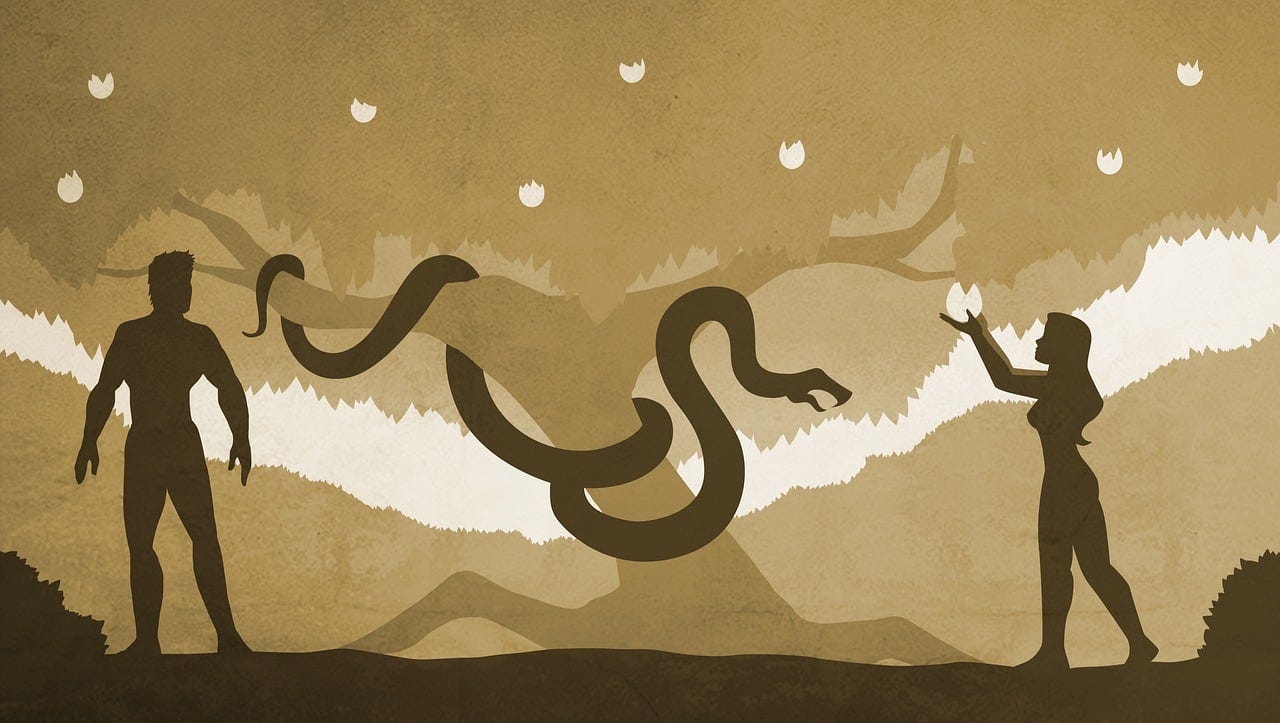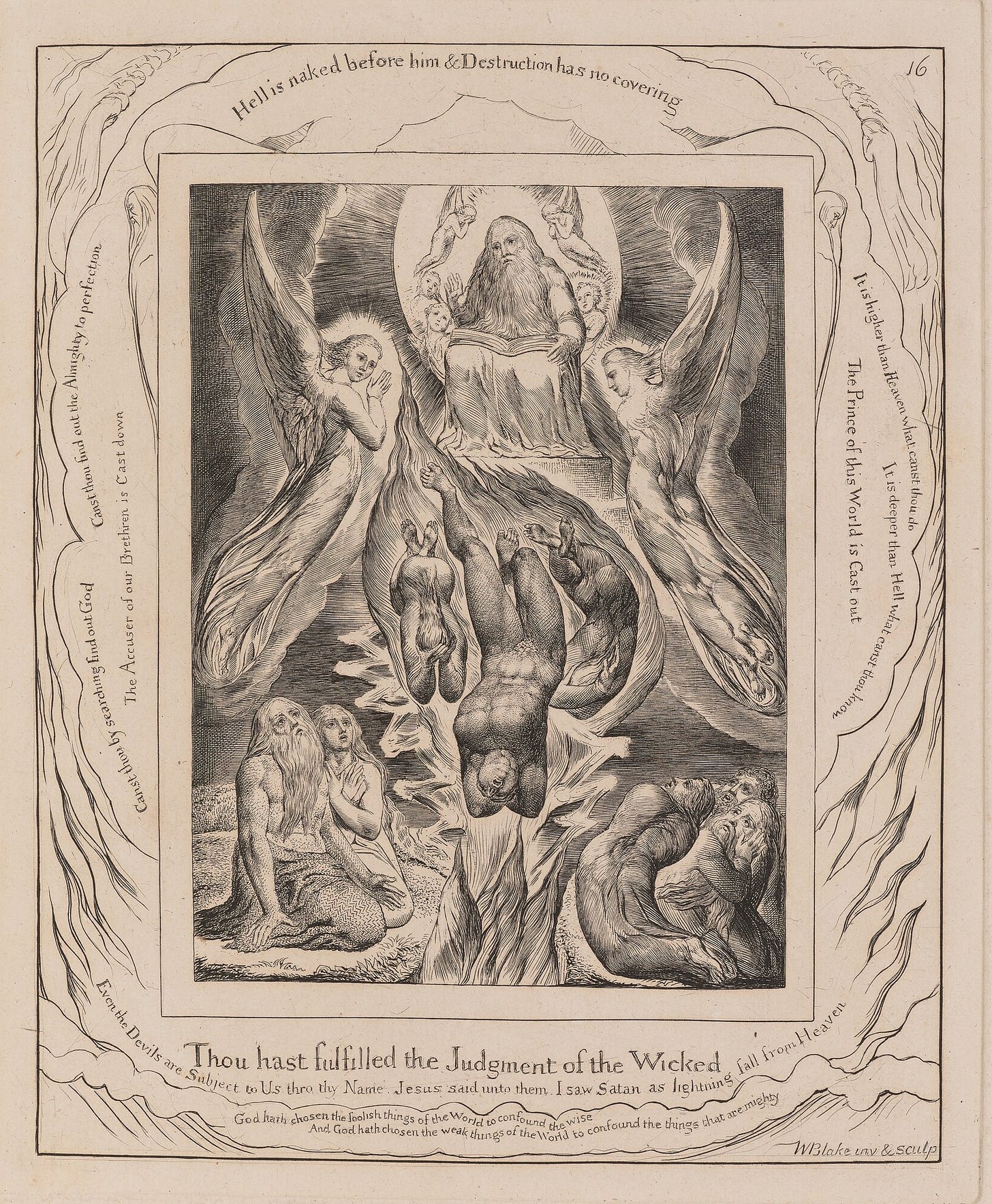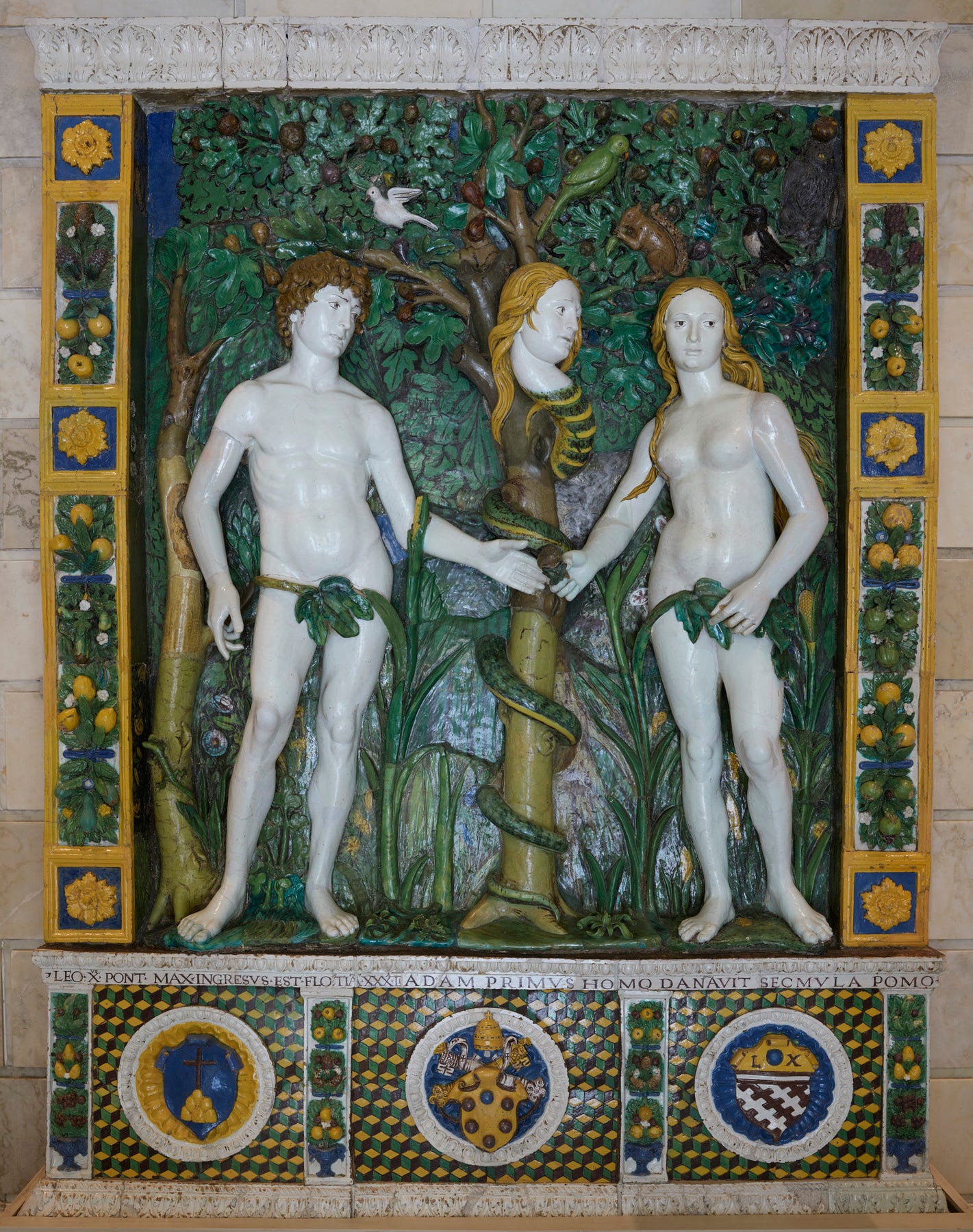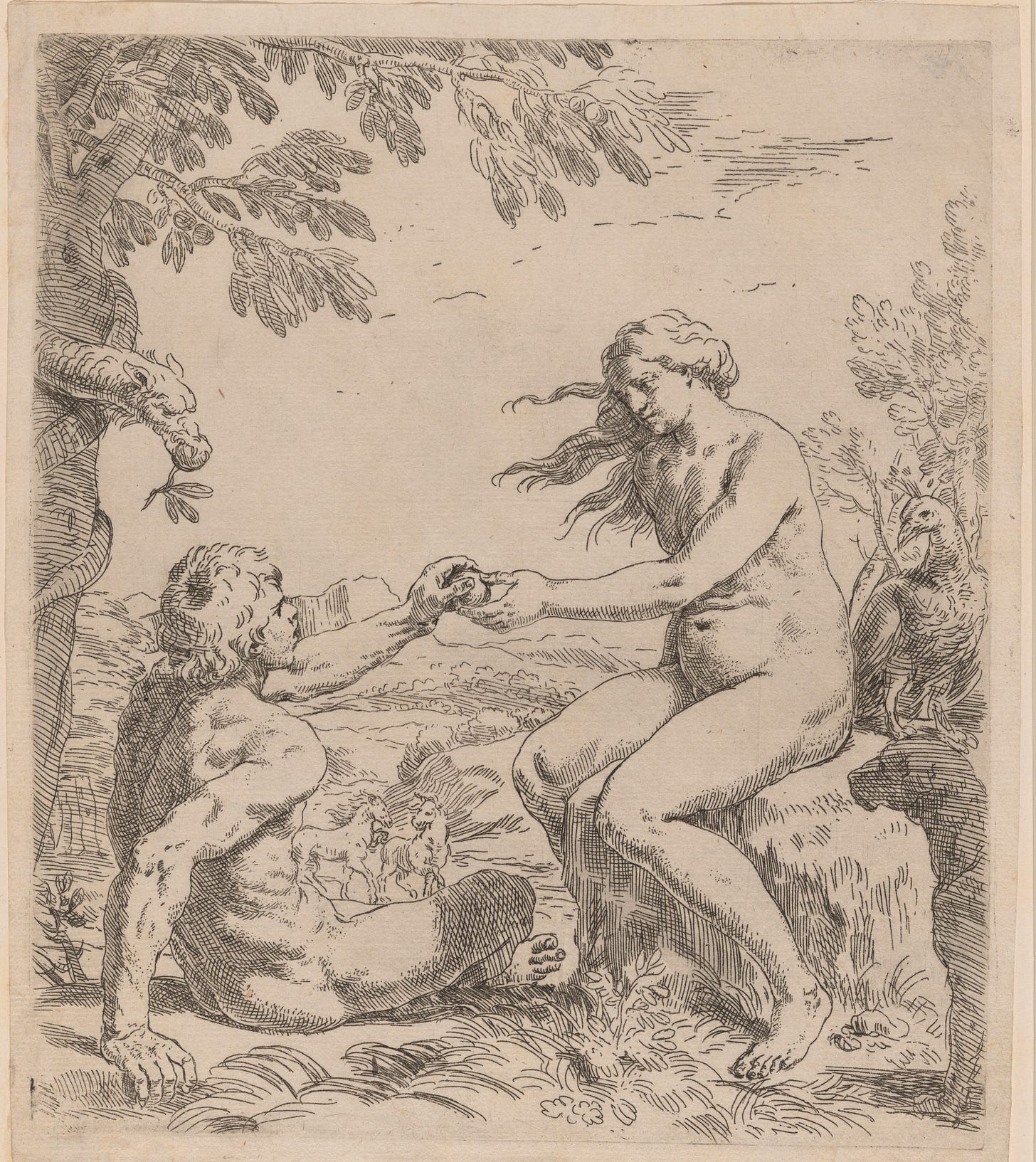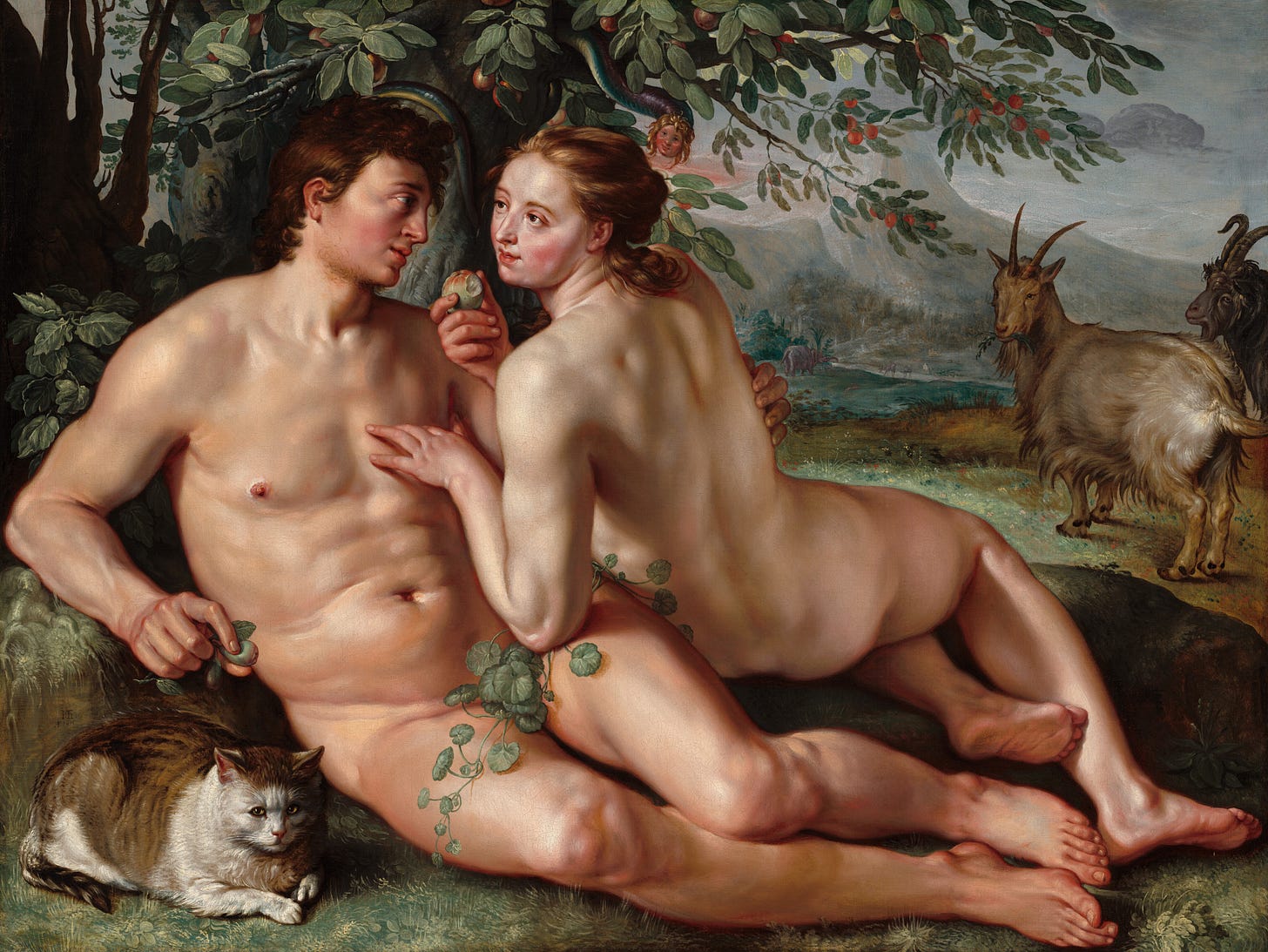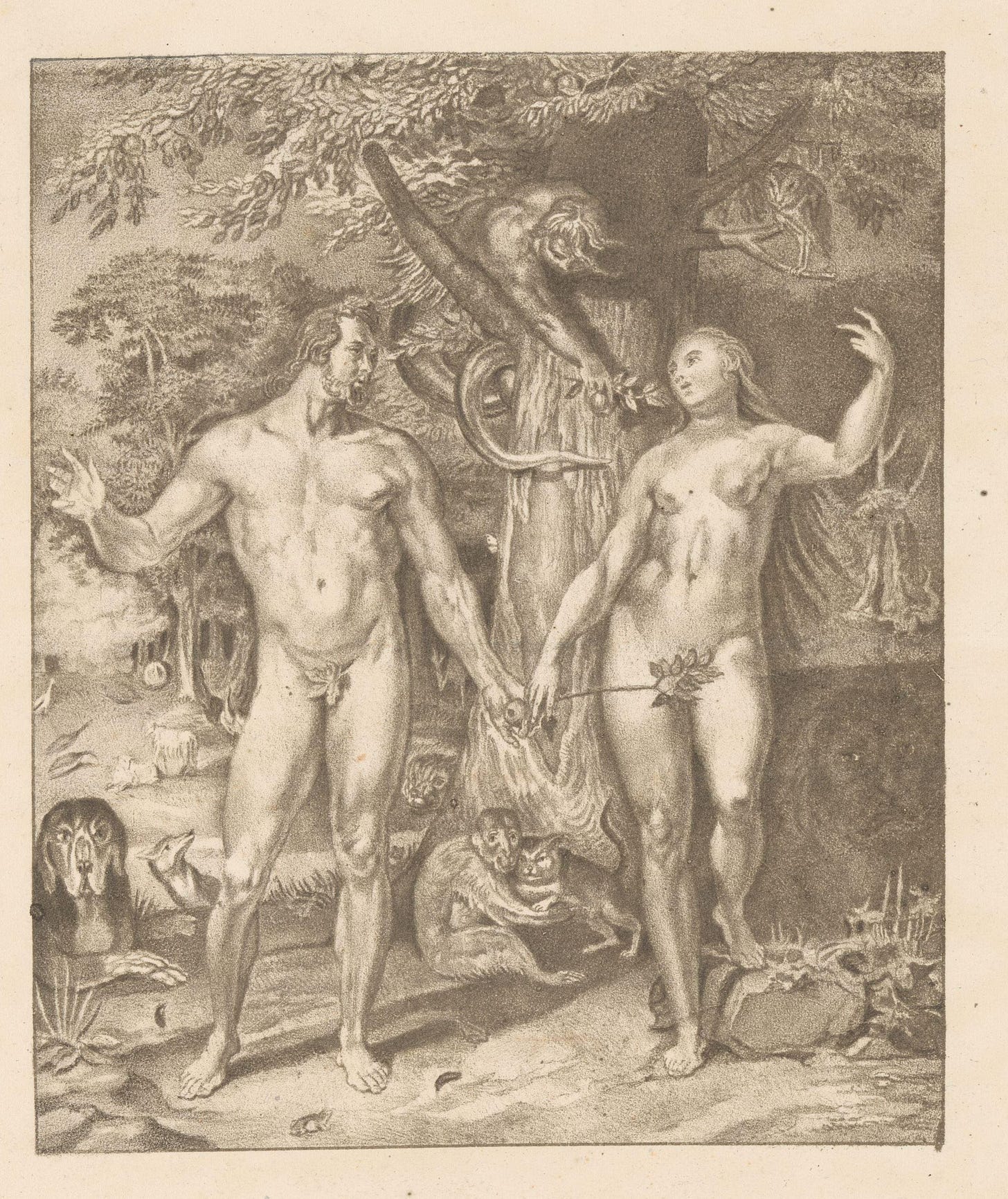The Fall of Man in Paradise Lost
John Milton’s gripping scene of the Fall in Paradise Lost captures the imagination with the biblical narrative.
The Fall of Man in Paradise Lost and Genesis 3
John Milton’s gripping scene of the Fall in Paradise Lost doesn’t correspond precisely to the unfolding of events as told in Genesis 3, but he captures the imagination with the biblical narrative. In his edition, the first man and woman have already been warned of danger, and the woman has already been tempted by Satan in her dream. All of this was preceded by Satan’s own infamous fall from heaven.
Milton carries on the long tradition of filling in the gaps left by the biblical narrator. But it is this imaginative gap-filling that makes his telling so compelling. Of course, Milton is doing more than simply exercising his theological imagination to retell the Genesis narrative. His comments address topics such as classical education, philosophy, and even economics. I am certain that I’m failing to detect (much less understand) many of these features of his writing.
I’m no expert on Paradise Lost, but as I studied Genesis 3:1-8 in preparation to preach, I couldn’t help but read the biblical text intertextually. I shared several lines of Milton’s poem in the sermon, but there were many more that I wish I could have included.
In what follows, I outline Book IX, including some of the most enchanting lines from Milton’s poem, along with a few reflections.
Satan’s “Imbrutation” (Lines 1-190)
The heavenly beings were charged with protecting Paradise from Satan’s entry, so he needed to find a way into the garden. After roaming the earth, he determines to enter into a sleeping serpent, temporarily possessing it. Satan determined the serpent would be a fitting vessel. In its unpossessed and natural state, the serpent was already wily and cunning. If Satan entered into a more brutish beast, it would surely raise suspicion (lines 89-96):
Fit vessel, fittest imp of fraud, in whom
To enter, and his dark suggestions hide
From sharpest sight: for in the wily snake,
Whatever sleights, none would suspicious mark,
As from his wit and native subtlety
Proceeding, which in other beasts observ’d
Doubt might beget of diabolic power,
Active within beyond the sense of brute.
Yet, in this base form of incarnation, truly an imbrutation, Satan ached against the humiliation of entering the serpent (Lines 97-98; 163-171):
Thus he resolv’d; but first from inward grief
His bursting passion into plaints thus pour’d;
…
O foul descent! that I, who erst contended
With gods to sit the highest, am now constrain’d
Into a beast, and mix’d with bestial slime,
This essence to incarnate and imbrute,
That to the height of Deity aspir’d;
But what will not ambition and revenge
Descend to? who aspires, must down as low
As high he soar’d, obnoxious first or last,
To basest things.
Satan’s foul incarnation and motivation (Revenge against the creator God—Revenge at first though sweet / Bitter ere long, back on itself recoils) humiliates himself. This incarnation contrasts starkly with the incarnation of our Lord Jesus, who, existing in the form of God, did not consider equality with God as something to be exploited. Instead, he emptied himself by assuming the form of a servant, taking on the likeness of humanity (Phil 2:6-7, CSB).
Satan then found the serpent (Lines 188-190):
The Devil enter’d, and his brutal sense,
In heart, or head, possessing, soon inspir’d
With act intelligential; but his sleep
Disturb’d not, waiting close th’ approach of morn.
Incarnate and imbrute, Satan readied himself for his attack.

Adam and Eve’s Communion & Separation (Lines 192-403)
Morning came and Paradise awoke, by nature worshipping God (Lines 192-197):
Now, when sacred light began to dawn
In Eden on the humid flowers, that breath’d
Their morning incense, when all things that breathe
From the earth’s great altar send up silent praise
To the Creator, and his nostrils fill
With grateful smell…
Milton’s imagery of the earth as an altar and flowers offering up their morning incense upon it is so captivating. From now on, when I see flowers open in the morning or smell their scent, I will forever think of these lines and imagine them as offering up incense to the Creator God.
Adam and Eve join in this worship, but then begin to plan their day. Through their work, the garden continued to expand. So Eve suggested that they divide their labor and reconvene at noon. Adam replies congenially, reflecting on the task before them and the sweetness of the conversation that they might have. He acknowledges the benefit of isolation (Lines 249-250):
For solitude sometimes is best society,
And short retirement urges sweet return.
But he is nevertheless concerned because they have been warned about the possibility of an assault by Satan. He expresses his concern that if they separate, Eve may be targeted and led to become disloyal either to God or to him. For that reason, he appeals for her to stay with him (Lines 261-269):
Whether his first, design be to withdraw
Our fealty from God, or to disturb
Conjugal love, than which perhaps no bliss
Enjoy’d by us excites his envy more;
Or this, or worse, leave not the faithful side
That gave thee being, still shades thee and protects
The wife, where danger or dishonour lurks,
Safest and seemliest by her husband stays,
Who guards her, or with her the worst endures.
Eve is offended (Lines 279-281):
But that thou shouldst my firmness therefore doubt
To God or thee, because we have a foe
May tempt it, I expected not to hear.
Adam responds with gentle “healing words” (line 290), appealing to her to remain with him. Eve remained offended, arguing for their separation. After, if Adam is worried that their matrimonial love could be disturbed by the serpent, what kind of love do they have that can not survive a test? And what kind of a paradise is Eden if their happiness is so susceptible? She expresses this powerfully (Lines 335-341):
And what is faith, love, virtue, unassay’d,
Alone, without exterior help sustain’d?
Let us not then suspect our happy state
Left so imperfect by the Maker wise,
As not secure to single or combin’d.
Frail is our happiness, if this be so,
And Eden were no Eden thus expos’d.
Adam remains uncertain, but eventually allows the separation, urging Eve to resist whatever temptation may come. He senses that forcing her to stay with him makes her more absent than if she went her separate way (Lines 372-375):
Go; for thy stay, not free, absents thee more;
Go in thy native innocence, rely
On what thou hast of virtue, summon all,
For God toward’s thee hath done his part, do thine.
Eve’s Temptation & Deception (Lines 404-837)
Satan, in the guise of the serpent, sought out the human couple. He hoped he might find Eve alone, but he knew that was likely outside of the realm of possibility. But then he came upon her all alone! He gained her attention and began his “fraudulent temptation.”
After his initial speech to Eve, she marveled at his ability to speak. She knew that the serpent was the subtlest of all the beasts of the field, but she didn’t know that he had the power of speech (Lines 560-565). The serpent explained that he had been like every other wild animal, but he had eaten from a particular tree that elevated his intelligence and gave him the power of speech (Lines 575-601).
Eve’s curiosity ignited, and she allowed the serpent to lead her to this tree (lines 643-645):
So glister’d the dire snake, and into fraud
Led Eve, our credulous mother, to the tree
Of prohibition, root of all our woe.
Initially, Eve points out that they’ve wasted their time coming to this tree because the tree was prohibited by God. God gave this singular law that must be obeyed; the rest of their lives were to be guided by the law of reason (Lines 647-654).
The entire temptation scene is fascinating and worth reading. Essentially, the serpent points out that if he could advance from animal irrationality to human-like rationality, how much more would she advance to godlike status? What is more, he then impugns God’s character and suggests that God’s prohibition is animated by selfishness. In fact, if they violate the command, rather than punishing them, God would reward them. If there is any death, it is the death of their limited humanity to take on divinity. His speech concluded, Eve convinced (Lines 733-734):
He ended, and his words replete with guile,
Into her heart too easy entrance won.
She adopted the serpent’s argument and then ate of the fruit (Lines 776-784):
Here grows the cure of all, this fruit divine.
Fair to the eye, inviting to the taste,
Of virtue to make wise: what hinders then
To reach, and feed at once both body and mind?
So saying, her rash hand in evil hour
Forth reaching to the fruit, she pluck’d, she ate;
Earth felt the wound, and Nature from her seat,
Sighing through all her works, gave signs of woe
That all was lost.
Eve is filled with pleasure, but eventually begins to wonder whether Adam would sense the change in her and whether her superiority over Adam would be desirable or undesirable. What is more, what if God has seen her, and death really does come as a consequence for eating? She imagines that she would be replaced by another Eve. She can’t bear the thought–this would be its own death.
She resolves (Lines 831-833):
Adam shall share with me in bliss or woe:
So dear I love him, that with him all deaths
I could endure, without him live no life.
Adam’s Contemplation & Transgression (Lines 838-1004)
Meanwhile, Adam waited for Eve to meet him at noon. While waiting, he made her a garland of flowers with which to crown her on their meeting. Still, something bothered him (Lines 845-846):
Yet oft his heart, divine of something ill,
Misgave him; he the falt’ring measure felt;
Then, Even came to him apologizing and explaining what had happened. She explains that the tree isn’t, as they have been told, dangerous or evil. Instead, it offers divine effects. In fact, she had eaten the fruit, and, unlike the treats, she did not die. So she urges him to also taste and join in “equal joy, as equal love” (Line 882), warning that if he fails to do so, he will disjoin them.
Adam was shocked by what he heard (Lines 890-894):
Astonished stood and blank, while horror chill
Ran through his veins, and all his joints relax’d;
From his slack hand the garland wreath’d for Eve
Down dropp’d, and all the faded roses shed:
Speechless he stood and pale…
Finally, he regains his composure enough to inwardly process what he heard. He knows the consequences for Eve’s transgression, yet he can’t imagine losing her, so he submits to join her (Lines 907-919):
And me with thee hath ruin’d, for with thee
Certain my resolution is to die.
How can I live without thee, how forego
Thy sweet converse, and love so dearly join’d,
To live again in these wild woods forlorn?
Should God create another Eve, and I
Another rib afford, yet loss of thee
Would never from my heart; no, no, I feel
The link of nature draw me: flesh of flesh,
Bone of my bone thou art, and from thy state
Mine never shall be parted, bliss or woe.
So having said, as one from sad dismay
Recomforted, and after thoughts disturb’d,
Submitting to what seem’d remediless…
He explains to Eve that what she has done cannot be undone (Lines 926-927):
But past who can recall, or done undo?
Not God omnipotent, nor Fate…
He then expresses his decision to partake of the fruit and link their destinies (Line 958-959):
Our state cannot be sever’d, we are one,
One flesh; to lose thee were to lose myself.
Eve responds with a love poem, expressing great joy that in this decision, he has fully proved his love for her (Lines 960-988). A few lines give the sense of her delight in his decision and her belief that instead of being separated by death, his eating of the fruit will link them in life and love:
This day affords, declaring thee resolv’d,
Rather than death, or aught than death more dread,
Shall separate us, link’d in love so dear,
To undergo with me one guilt, one crime,
If any be, of tasting this fair fruit,
Whose virtue for of good still good proceeds,
Direct, or by occasion, hath presented
This happy trial of thy love, which else
So eminently never had been known.
She goes on,
On my experience, Adam, freely taste,
and fear of death deliver to the winds.
Overcome by his love for her, she continues (Lines 990-993):
She embrac’d him, and for joy
Tenderly wept, much won that he his love
Had so ennobled, as of choice to incur
Divine displeasure for her sake, or death.
She then took a bountiful portion of fruit and handed it to him. Adam’s decision made (Lines 998-1004):
Against his better knowledge, not deceiv’d,
But fondly overcome with female charm.
Earth trembled from her entrails, as again
In pangs, and Nature gave a second groan;
Sky loured, and muttering thunder, some sad drops
Wept at completing of the mortal sin
Original; while Adam took no thought…
Adam & Eve’s Celebration (Lines 1005-1045)
The immediate outcome of Adam’s eating is not death, but pleasure and joy. In fact, they both become convinced that it is the forbidden things that prove truly fulfilling. It is their wish that instead of forbidding only one tree, God would have forbidden ten (likely an allusion to the ten commandments) so that they could eat of those trees as well (Lines 1022-1026):
Much pleasure we have lost, while we abstain’d
From this delightful fruit, nor known till now
True relish, tasting; if such pleasure be
In things to us forbidden, it might be wish’d,
For this one tree had been forbidden ten.
It’s interesting that both of them justify their decision on the basis of their eternal and undying love for one another. In the immediate, it seems that this decision proves true. After eating, Adam is astonished at his wife’s beauty. They become intoxicated with each other and with “their mutual guilt the seal, / The solace of their sin,” they have sex and finally fall asleep, “wearied with their amorous play.”
Adam & Eve’s Broken Communion (Lines 1046-1189)
When Adam and Eve wake up, they do so as waking from unrest (Lines 1047-1052). Now, their sleep is not refreshing, but the kind of guilty and heavy sleep that leaves them more tired than before. Now, their eyes are open, bringing about the unhoped-for consequences of eating (Lines 1053-1064):
Soon found their eyes how open’d, and their minds
How darken’d; innocence, that as a veil
Had shadow’d them from knowing ill, was gone,
Just confidence, and native righteousness,
And honour from about them naked left
To guilty shame; he cover’d but his robe
Uncover’d more. So rose the Danite strong,
Herculean Samson, from the harlot-lap
Of Philistean Dalilah, and wak’d
Shorn of his strength. They destitute and bare
Of all their virtue; silent, and in face
Confounded, long they sat, strucken mute…
Milton packs in so much here: The nakedness that, when covered, is all the more exposed; the image of Samson waking only to be less than what he was; the fruit that supposedly gave the serpent the power of speech now leaves them speechless; Adam’s enchantment with Eve’s beauty replaced by mutual shame at their nakedness.
When Adam does regain his speech, he blames Eve for succumbing to temptation and plots to cover themselves with fig leaves. But even after they hide their nakedness, no amount of covering could give them rest or ease of mind (Line 1120).
Then, they helplessly drop to the ground as their fallen state sinks in (Lines 1121-1126):
They sat them down to weep; nor only tears
Rain’d at their eyes, but high winds worse within
Began to rise, high passions, anger, hate,
Mistrust, suspicion, discord, and shook sore
Their inward state of mind, calm region once
And full of peace, now toss’d and turbulent.
They then begin to blame one another for their current condition—so much for their undying love for one another—fighting fruitlessly in their shame (Lines 1187-1189):
Thus they in mutual accusation spent
The fruitless hours, but neither self-condemning
And of their vain contest appear’d no end.
Book IX closes, leaving this couple in such a sad state.
The Imaginative Power of Paradise Lost
Milton’s Paradise Lost is not a commentary on Genesis. In fact, if anything, Milton’s depiction of Satan as ruler of the fallen angels (along with the backstory of Satan’s fall) probably does more to misinterpret Ezekiel 27-28 and Isaiah 14:12 than it does to shed light on the meaning of Genesis 3. So why spend so much time in Paradise Lost?
Ultimately, the best readings of Paradise Lost won’t compare and contrast the biblical narrative to find discrepancies or to fill in the gaps that the Genesis author leaves undescribed. Reading Genesis 3 intertextually with Paradise Lost shouldn’t emphasize discrepancies between the two, but rather the way in which Paradise Lost takes us further into the Genesis narrative. The best readings of Paradise Lost are those in which the reader allows their imagination to be captivated by the imagery, drawn into the biblical story.
I admit, it takes a while to adjust to Milton’s cadence and vocabulary. But these obstacles are worth overcoming.
Milton’s words pull our emotions in the right direction, helping us sense the futility of sin and rebellion against God and to feel what was lost in the Fall. He gives words to match the theological realities of sin and temptation. He engages imaginatively and emotionally the parts of us that might otherwise remain untouched or unmoved by the economy of words in Genesis 3. Read in this way, Paradise Lost helps us to think and feel rightly in response to the Genesis narrative. In this way, Milton helps us worship with our whole being.




